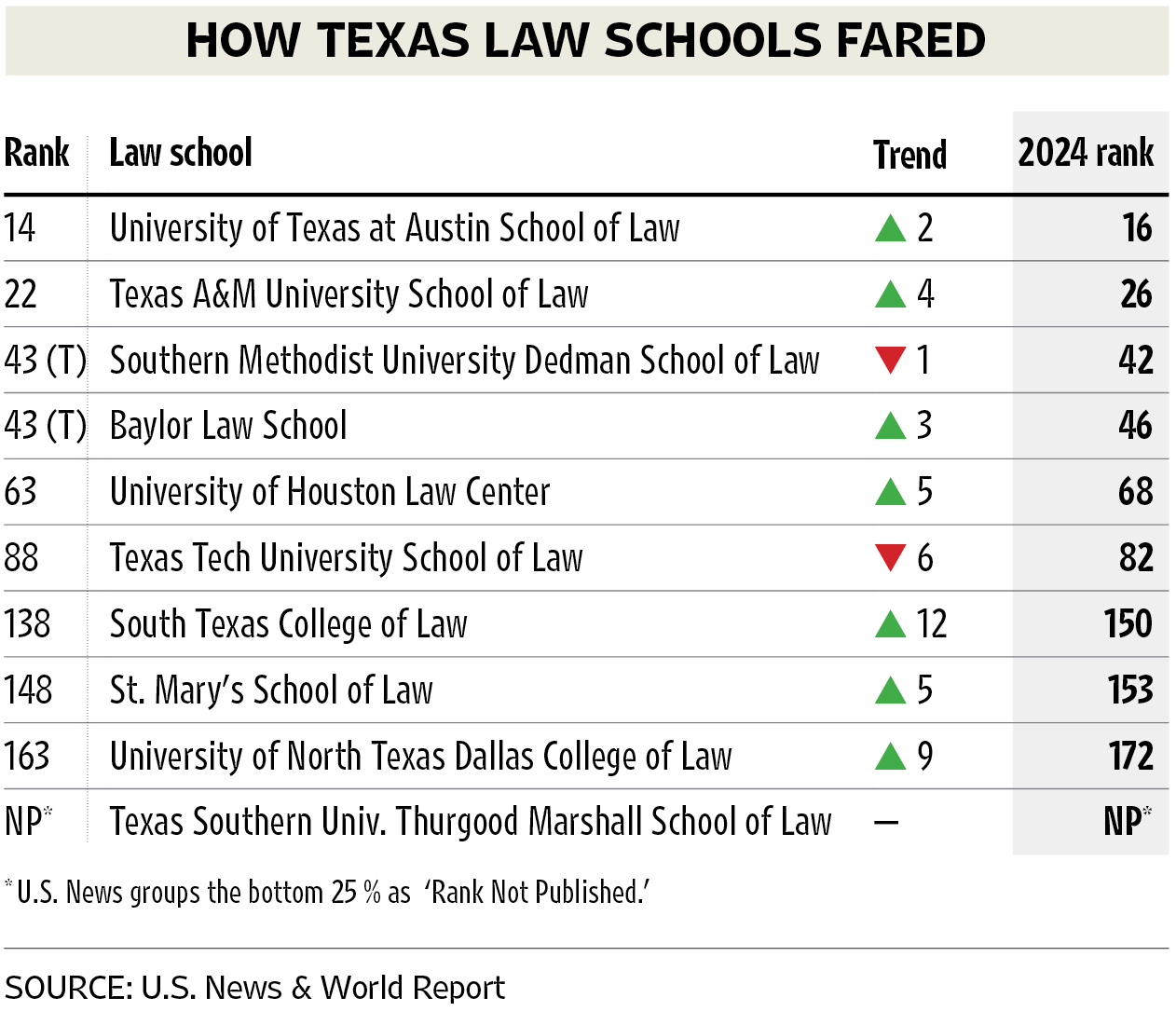The Texas A&M School of Law is the 22nd best law school in America, according to rankings released today by U.S. News & World Report.
Among 10 Texas law schools, only the University of Texas at Austin School of Law, the state’s flagship law school, was ranked higher, at No. 14.

With A&M’s first entry into the top 25, the Fort Worth school “has risen further and faster than any law school in rankings history,” a news release from the law school said.
The A&M School of Law was unranked on the first U.S. News list published after the Texas A&M University System acquired the school in 2013 from Texas Wesleyan University. The next year, it was ranked 149th. It cracked the top 50 in 2022, when it was No. 46. This year’s ranking is four spots up from last year’s.
Among the impressive metrics A&M credits for its growing recognition are a 100 percent employment rate for recent graduates, the highest bar passage rate in Texas for the second year in a row, and a first-year class with the highest median undergraduate grade point average in the United States.

If you think the top 25 is a big deal, just wait, said John Sharp, chancellor of the Texas A&M System.
“When I started as chancellor [in 2011],” Sharp said, “my first goal was to acquire a law school for Texas A&M, but not just any law school — we wanted one with huge potential.
“This rise in rankings is evidence that we are accomplishing our goal, and I am certain that Texas A&M’s School of Law will be in the top ten in no time.”
Many law school deans and other academicians have questioned whether the U.S. News rankings are an accurate measure of a law school’s performance. They’ve said in the past, for example, that the rankings overvalue students who test well and, upon graduation, land prestigious, high-paying jobs over other metrics, such as dual degrees that may take longer to earn, and internships and fellowships after graduation.
The grumblings, moreover, haven’t just come from schools that felt they’d gotten the shaft. In late 2022, Yale University and Harvard University famously announced that they would no longer voluntarily take part in the U.S. News rankings of law schools and other academic programs. Other schools quickly followed their lead, declining to complete surveys from the magazine.
U.S. News, which said it continually fine-tunes its methodology to assess the comparative standing of law schools more accurately, continues to rank even those schools that choose not to participate in its surveys, relying on information available through the American Bar Association and other sources.
Reservations about the rankings notwithstanding, schools for the most part would rather be ranked highly than not. Those that secure a lofty spot on the U.S. News list are usually quick to spread the word to alumni, faculty, students, and prospective students and to mention their high ranking in marketing, recruiting and fund-raising campaigns.

“Students applying to law schools are aware of these numbers,” said Robert B. Ahdieh, dean of Texas A&M’s law school. “Rankings help in recruiting, which means the quality and character of our students keeps going up. Our ranking is also a way to crack the nut with employers and with donors. When you’ve been called the 22nd best law school in the country, you’re on their radar screen of folks in a different way.
“Rankings are only accurate to a degree,” he continued. “They’re accurate within a plus or minus range of X, but that’s it. They’re not absolute.
“I am much more interested in our trajectory than in our ordinary ranking in any given year. When you consider Texas A&M Law’s steady progress over time, that trajectory is a reflection of the underlying achievements we have made.
“It is of course gratifying to see our progress reflected in various rankings,” he said. “But tomorrow is another day, and our work will continue. Stay tuned for more to come!”
AT A GLANCE: Digging Deeper into the Rankings
Some Texas law schools that weren’t highly ranked overall by U.S. News nonetheless found reasons to celebrate in the many subcategories the magazine evaluates:
- The University of Houston Law Center (63rd overall), was ranked fifth among the nation’s part-time programs, ninth in healthcare law, 12th in intellectual property law, 15th for its legal writing program, 23rd for its, dispute resolution program and 29th in trial advocacy.
- Texas Tech University School of Law (88th overall) was ranked 34th in trial advocacy and 44th for legal writing.
- St. Mary’s School of Law (148th overall) was tied for 16th best advocacy program, 35th best dispute resolution program, and 36th best part-time program.
